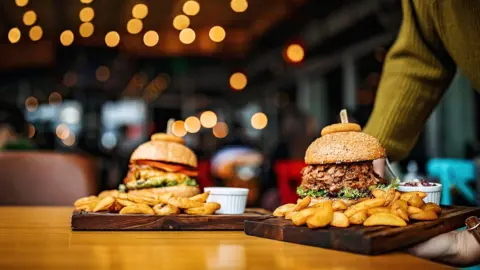 Getty Images
Getty ImagesPutting calories on food labels and menus “is no silver bullet” say researchers, who analysed the best evidence to date on how effective the policy can be.
A review of 25 studies on calorie labelling in a number of countries found a small reduction in the calories people chose to eat – equivalent to two almonds – but even this modest effect could help prevent adults putting on weight as they get older.
The new rules on calorie labelling came into force in England in 2022 as part of government plans to encourage people to make healthier choices.
The government said it would continue to evaluate the impact of out-of-home calorie labelling, including on people with eating disorders.
Restaurants, cafes and take-aways with more than 250 staff must now show how many calories are in meals on their menus.
For Imara, a 27-year-old HR assistant from Birmingham, the change has been a positive part of her weight-loss journey.
“It has meant that I have been able to stay on track, stay within my calorie deficit and still enjoy a nice meal out with friends, or with my husband, and still have a good time and not worry about falling off track.
“Sometimes I will just have a meal and not think about the calories,” she says.
“But if it is a day or a week where I do want to stay on track then I will look at the calories and see whether it is something that will fit within my goals.”

The research looked at studies of the impact of calorie labels in supermarkets, restaurants and other food outlets in countries including the United States, UK, Canada and France.
In a 600-calorie meal, it found an average reduction of 11 calories (or 1.8%) in the food people chose and bought.
Senior author Dr Gareth Hollands from University College London, said there was “a small but potentially meaningful effect on people’s food choices” but “we should not expect miracles”.
He said calorie labelling “may have a useful role” alongside other measures, such as taxes on food and drinks, marketing restrictions and reformulation – making manufacturers adjust recipes for food products to make them healthier.
Dr Natasha Clarke of Bath Spa University, who began the project at the University of Cambridge, says the evidence is “robust”.
And as calorie labelling becomes more widespread, the effect could have a “meaningful contribution” to public health.
‘Toxic way to look at food’
 Milly Goldsmith
Milly GoldsmithHowever, charities say the policy can make people with eating disorders feel more anxious about food, which could trigger a relapse.
Milly Goldsmith, 27, a lifestyle influencer from London, struggled with anorexia nervosa and body dysmorphia from the age of 13 to 18.
She says calorie counting is what “fed” her eating disorder.
“I really feel it is just reinforcing those eating habits and making it a really toxic way to look at food.”
Though Milly is in recovery, she describes the constant battle between her “eating- disorder brain” and “logical brain” not to fixate on the calories in her meals.
The review acknowledged a “lack of data” of the possible harms including mental health impacts, and the authors have recommended future research to assess this.
To encourage healthier eating, the government has already announced plans to ban junk food adverts on TV and online in England, alongside calorie labelling.
This is part of a wider plan to tackle high rates of obesity.
A Department of Health and Social Care spokesperson said: “We have also given local authorities stronger powers to block applications for unhealthy takeaways near schools, to stop fast-food giants targeting pupils.”
The Scottish government has been consulting on whether restaurants and cafes must display calorie levels.



